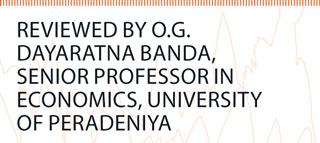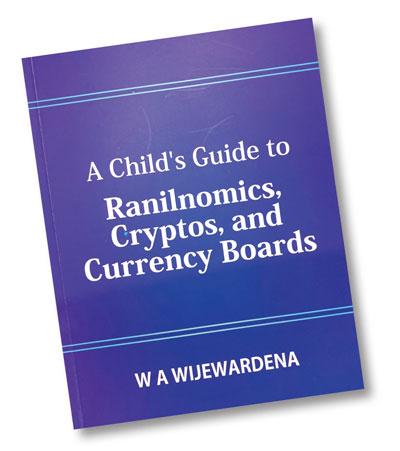28 Mar 2023 - {{hitsCtrl.values.hits}}
 I can’t imagine how challenging it would be to understand and tackle the current economic catastrophe in Sri Lanka, but I do know that Dr. W.A. Wijewardena has done it with finesse only a very senior expert like him possibly could.
I can’t imagine how challenging it would be to understand and tackle the current economic catastrophe in Sri Lanka, but I do know that Dr. W.A. Wijewardena has done it with finesse only a very senior expert like him possibly could.
For several years, Dr. Wijewardena, myself, and various other experts,that included ex-central bankers and known macroeconomists in Sri Lanka, have predicted, warned, and proposed appropriate policy measures to prevent falling the country into the impending currency crisis, and the subsequent economic disaster for which responsible politicians and others turned blind eyes and deaf ears. While the discussion and debate on the monetary disaster have been unravelling, I was fortunate to read a fascinating new book on the most prominent monetary economics issues of the day written by Dr. W.A. Wijewardena, who was a former deputy governor of the Central Bank of Sri Lanka.
 As is well known, many have written and spoken, and still, they are, about Sri Lanka’s unprecedented economic crisis. While many myths and fallacies have been presented in the process by many, Dr.Wijewardena’s book “A Child’s Guide to Ranilnomics, Cryptos, and Currency Boards” stands out as a masterpiece among them that undeniably enlightens everybody including the general public, policymakers, and economists of the intricacies of the macroeconomic policy management, or rather mismanagement in Sri Lanka. The book is simple to read but rigorous in scientific analysis, and easy to follow. In terms of analysis and the rigour with which it is written, the book also fits well within the domain of advanced applied monetary economics literature making it a valuable reading for students.
As is well known, many have written and spoken, and still, they are, about Sri Lanka’s unprecedented economic crisis. While many myths and fallacies have been presented in the process by many, Dr.Wijewardena’s book “A Child’s Guide to Ranilnomics, Cryptos, and Currency Boards” stands out as a masterpiece among them that undeniably enlightens everybody including the general public, policymakers, and economists of the intricacies of the macroeconomic policy management, or rather mismanagement in Sri Lanka. The book is simple to read but rigorous in scientific analysis, and easy to follow. In terms of analysis and the rigour with which it is written, the book also fits well within the domain of advanced applied monetary economics literature making it a valuable reading for students.
The book takes us through ideological and practical policy contexts as well as issues and controversies in an appropriate political context with a serious regard for modern monetary economics. The student-teacher dialogue approach practiced by Lord Buddha, Plato,as well as various other thinkers, has been skillfully used in the investigation into macroeconomic policy issues. The book is arranged in three broad areas including Ranilnomics, Cryptos, and Currency Boards, each of which contains a number of timely policy analysis chapters to address different important aspects of policy highlighting trials, tribulations, and tragedies of economic policies in Sri Lanka. Many missed opportunities for the country and serious policy blunders have also been discussed and highlighted.
Section 1 of the book contains eight chapters including ‘winning the ideological differences’ that bring forward the ideological battle existing between the social market economy ideology promoted by Ranil, who is an ideological opponent of the left and economic nationalists, and the centre-left/nationalistic policy ideologies of the Pohottu members of parliament who support Ranil.
Chapter two of the book uncovers the fallacies of import control policies adopted by policymakers in Sri Lanka. The author then goes on to discuss the good governance discourse drawing from the teachings of Lord Buddha to enlighten the masses on the centrality of good governance as the foundation of sound policy, policy implementation, and sustainable development. In order for policies to be effective, policymakers should make the people the owners of the policy.
Also, the country needs to ensure that we honour human rights, observe rule of law, and have an effective system to eradicate waste, bribery and corruption to ensure good governance. Once these are established and followed, there will be no business for the international community in our domestic affairs, and we will be able to maintain conducive conditions and structures for sustainable inclusive economic development in a sound policy context.
The author also skillfully discusses the issue of debt restructuring in the context of the IMF bailout. Making the country’s debt sustainable and that the country keeps repaying its debt is a prerequisite to obtaining IMF assistance and making the country’s sovereign debt sustainable. He also discusses various other impediments, rivalries and undercurrents in dealing with this matter.
The author also highlights the fact that the IMF bailout package stands to assist Sri Lanka to get out of the current mess, and put the country on the sound growth path. An important chapter in the book is on the continuous and irresponsible manner in which the successive governments in Sri Lanka have managed fiscal policy highlighting the disastrous manner in which government expenditure has been increased up to a level of catastrophe.
He reiterates the long-standing argument that he and most of us have been making for more than a decade that Sri Lanka’s fiscal deficit is unsustainable and that the country has been headed towards an economic disaster. The book reiterates that better to correct them sooner than later. He also goes on to discuss the need to implement economic and institutional reforms to get out of the current economic catastrophe.
There has been much hype for a few years about the adoption of cryptocurrencies in Sri Lanka. Through a number of chapters, the author discusses the road to consideration of cryptocurrencies, the difference between traditional currency and cryptos, the issues and problems with cryptocurrency and its usage, and the regulatory requirements for cryptocurrencies. The author also discusses the merits and demerits of cryptos and the actions taken by various countries to ban or limit the use of cryptos considering the fact that cryptos limit the manageability of policy by monetary authorities, and are not beneficial to the monetary authority in managing the system.
In a number of chapters in section three, the author extensively discusses the currency board system which some have proposed in the context of the currency crisis in Sri Lanka. It examines the origin, development and transition from the monetary board system to the Central Bank, and how the balance of payments-based system tends to discipline the monetary and fiscal policies with automatic limits and brakes for stabilization.
The author also evaluates the performance of the currency board system in Sri Lanka and concludes that import-dependent countries like Singapore have been able to maintain a strong currency for decades, contain inflation, and prevent people from expecting various unsustainable subsidies from the government which would automatically create twin deficit problem and monetary destabilization. Dr. Wijewardena eloquently presents evidence of policy mismanagement that prevailed in Sri Lanka for years due to incompetence and partisan political actions of some members of the monetary policy decision-making body, and how we came to a level of bankruptcy. Though Sri Lanka is a classic case of a man-made economic disaster, policymakers are still struggling to come to their real senses, and heed to the wiser counsels to get out of the catastrophe.
This seminal piece of work by Dr. Wijewardena goes beyond conventional writings in economics. It traverses into serious academic discussions on central banking and monetary policy, cryptos, and macroeconomic mismanagement. The book is concise, easily readable, and scientifically sound. All subject matters discussed are well grounded on the most up-to-date and well-articulated theories and applications of macroeconomics.
The book reflects the depth of knowledge, advanced research, practical applications, and experience of a central banker turned academic who is valiant, eloquent, and rigorous in dealing with very complex monetary matters to present them in a simplistic but scientifically sound manner for students, policymakers, and academics to understand as well as dwell into further discussions and investigations.
As the country is in a made-made economic catastrophe, it is imperative that politicians, bureaucrats, and the general public read the book, discuss it further, and be cognizant of the dangers and failures of macroeconomic management, and how and why the policymakers should listen and follow the wiser counsel of the enlightened ones rather than relying on economic-gossips propagated and promoted by naysayers and pseudo pundits turned advisers. The lesson learnt from Sri Lanka’s economic catastrophe is that refusing to heed wiser counsel places us on a pathway to destruction.
07 Jan 2025 7 hours ago
07 Jan 2025 7 hours ago
07 Jan 2025 8 hours ago
07 Jan 2025 07 Jan 2025
07 Jan 2025 07 Jan 2025